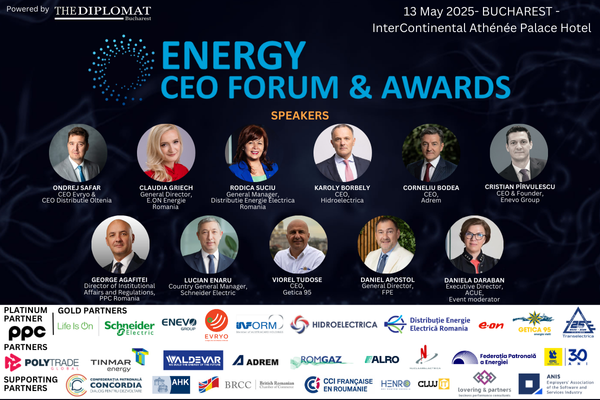Opinion by Mihaela Croitoru, Sustainability, Climate Risk and ESG Advisor |CEO Sustainability Lens SRL
Europe is today at a crucial turning point: it must intelligently and coherently combine sustainability objectives with the imperatives of economic competitiveness. The succession of crises – the COVID-19 pandemic, the war in Ukraine, geopolitical tensions and global economic instability – has redefined strategic priorities and created a unique opportunity for Europe and Romania.
In this context, the Omnibus Package proposed by the European Commission does not represent a renunciation of the Green Deal, but a pragmatic step to strengthen companies, so that they can subsequently support investments in climate change mitigation and adaptation measures. The ultimate goal remains to achieve climate neutrality, but through a more realistic and sustainable path.
A central element of the Omnibus is the simplification of sustainability reporting standards, postponing the application of obligations for the second wave of companies by two years and excluding companies with fewer than 1,000 employees from the CSRD. This measure recognizes that the initial standards, although ambitious, have proven complex and costly, requiring specialized internal teams, consultants and auditors with solid experience, making it essential that in such a sensitive area, collaboration with recognized and experienced professionals is essential, who ensure the quality and credibility of the information.
Also, given the warnings of researchers that the objectives of the Paris Agreement are becoming increasingly difficult to achieve and that we must prepare for a possible increase in global temperature by up to 3.5°C, it is essential that companies invest not only in reducing emissions, but also in adapting to climate change. The financial consolidation of companies is vital for them to be able to support these efforts.
Through the proposed measures, the Omnibus Package promotes a balanced approach: large companies, the main generators of climate impact, remain a priority, while smaller firms are encouraged to voluntarily adopt sustainability, given the necessary time to consolidate their economies in a volatile global context.
Competitiveness: a Sustainability Imperative
A company that is not competitive will not be able to invest in green technologies or social projects. As the Draghi Report underlines, Europe must continue the green transition in a pragmatic way, anchored in economic realities.
This requires massive investments in strategic sectors – renewable energy, green technology, digitalisation, defence and security – sectors that will protect the environment and boost economic prosperity. Europe must not give up its climate leadership, but rebuild it on solid foundations.
Romania: A Historic Opportunity
For Romania, this paradigm shift could represent an opportunity to revitalize and strengthen strategic industries: metallurgy, aeronautics, shipbuilding, electronics and IT. Possible approval from Brussels to redirect PNRR funds to these sectors could support the development of a modern and competitive defense industry, without implying excessive militarization, but rather consolidating industrial capacities and reducing the budget deficit. Aluminum, steel, electronic components, software systems or naval structures are just some of the essential products where Romania can excel and where it has the necessary expertise.
In addition, the increase in demand for armored vehicles, drones, protective equipment and military ships could support long-term economic development. These investments will indirectly support other economic sectors, strengthening national infrastructure and production capacity.
Extended Sustainability: More than Environment
Sustainability must be seen holistically: it is not only about reducing CO2, but also about creating sustainable jobs, reducing energy dependence, diversifying supply sources and strengthening social cohesion. A robust economy can better invest in green technologies in the future, provide decent wages and support the global energy transition.
It is true that accelerating economic growth may generate additional emissions in the short term, but if Europe manages to strengthen its industrial and financial base, it will have more capacity in the medium and long term to invest in climate change mitigation and adaptation technologies. Thus, economic consolidation becomes a necessary condition for being able to realistically and effectively sustain climate ambitions.
Europe, although not the main source of global pollution, can become the world leader in green technologies – if it manages to strengthen its economy.
Conclusion
The Omnibus Package, the Draghi Report, the implementation of the ESRS and the new geopolitical realities demonstrate that sustainability and competitiveness are not opposing objectives, but complementary. Europe, and implicitly Romania, must invest intelligently today to become a greener, more resilient and more prosperous economy in the future. In this process, companies must continue their journey towards sustainability, not only as an end in itself, but as a fundamental condition to remain competitive and access new development opportunities. Integrating sustainability into business strategy will open access to more advantageous financing, international partnerships and premium markets. However, producing a sustainability report is not an end goal, but only a calling card that reflects the strength, seriousness and ambition of a company. In reality, what really matters are the concrete measures implemented, without which reporting remains formal. Real investments in sustainability ensure not only data to report, but also sustainable economic performance in an increasingly demanding business environment




